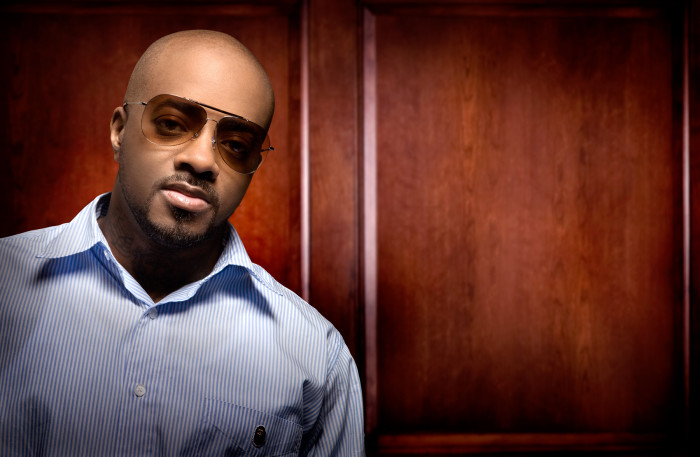As the music industry debates the fallout from the “Blurred Lines” copyright verdict, Grammy-winning producer Jermaine Dupri finds himself sympathetic to both Pharrell and Marvin Gaye’s family.
Dupri, who helped Usher reach superstar status, aided in Mariah Carey’s ultra-successful comeback a decade ago and produced for the diva in 1990s, remembers his days as a budding producer who drew inspiration from the artists who came before him — but also says there is a startling similarity between a new single and a hit he co-wrote more than a decade ago.
“Younger producers like myself and Pharrell, we make records that are influenced by other records that are out there,” Dupri said in an interview Thursday. “That’s how hip-hop has always been created — it has some kind of element of something (from) the past. Or sometimes we just take the entire sample and we give the artist the credit for that sample.”
“We’ve all been in a position where it could go like this or we can give the producer the credit,” he added.
Pharrell and Robin Thicke were ordered to pay nearly $7.4 million to three of Gaye’s children after a jury determined the performers copied elements of the R&B icon’s 1977 hit, “Got to Give It Up.”
“Blurred Lines,” which also featured rapper T.I., was the biggest hit of 2013: It sold more than seven million tracks in the United States alone, topped the pop charts for months and earned top Grammy nominations. Attorneys for the collaborators filed a pre-emptive lawsuit in August 2013 asking a judge to determine the hit didn’t copy other songs.
“My first time hearing it, I was like, ‘This might be a problem.’ I kind of felt like that,” Dupri said. “Them going to court was really more shocking than anything.”
The 42-year-old Dupri, who has co-written and co-produced No. 1 hits such as Carey’s “We Belong Together” and “Always Be My Baby,” Usher’s “Burn” and Monica’s “The First Night,” said he is “50/50” about the “Blurred Lines” case because he understands both sides. He says he’s currently in a similar situation: Dupri claims R&B singer Ciara’s latest song, “I Bet,” is too close to Usher’s “U Got It Bad” — the massive 2001 hit that Dupri also co-produced — for comfort.
“Ciara’s new single is a complete rip-off of Usher’s ‘U Got It Bad,'” Dupri said. “I’m clear on what I made and I’m clear on how music influences people and I’m clear on chord changes and how people move things. … It might not be as evident as the ‘Blurred Lines’ situation, but I believe the same thing happened to me.”
Dupri said he, Usher and producer Bryan-Michael Cox all noticed the similarities immediately. And he said “I Bet” also sounds like R&B singer Tamia’s “Still,” another song he produced.
Dupri said he plans to contact Ciara and the producers of “I Bet,” which was released in January and has peaked at No. 27 on Billboard’s R&B/Hip-Hop songs chart, and ask that he, Cox and Usher be properly credited.
A personal representative for Ciara referred questions to a label spokeswoman. That spokeswoman did not return email and text messages seeking comment.
The Associated Press reached out to several performers, songwriters, publishers and record executives about the effect the “Blurred Lines” case would have on the industry; most declined to comment.
Keith Urban said he had “mixed feelings” about the verdict.
“I was shocked, honestly. Because it seems more like a sound and a feel and style and a genre and an era, none of which can be copy written,” he said.
He added that because “Blurred Lines” was such a ubiquitous song, “you’ve got a bigger target on your back.”
The Gaye family will seek an injunction against “Blurred Lines,” giving them possible control to negotiate for royalties and other concessions. Millions more in potential future profits for “Blurred Lines” are also at stake.
Though Pharrell and Thicke are billed as the writers of “Blurred Lines,” Thicke told jurors he didn’t write the song and Pharrell testified he crafted it in about an hour in 2012. Pharrell also testified that Gaye’s music was part of the soundtrack of his youth.
Two years ago, the song marked a breakthrough for Thicke, a successful R&B singer at the time, and helped Pharrell continue to reach new heights as a producer but, more importantly, as a solo act. The success came around the time he co-starred on Daft Punk’s “Get Lucky” and launched his single, “Happy,” last year’s top track.
Dupri, who has overseen the careers for acts including Kris Kross, Bow Wow, Da Brat and R&B groups Xscape and Jagged Edge, said whenever he had thoughts of releasing a song without properly giving credit to an older tune, his label stepped in.
“It’s crazy because I’ve tried to get away with records like that, where I was influenced by something, and the record company wouldn’t budge; they wouldn’t put the record out until I got whatever they thought they heard in the song cleared. That’s the most amazing part about this whole case to me period,” he said.
Dupri said they almost had trouble with sampling before they released Carey’s latest album, “Me. I Am Mariah… The Elusive Chanteuse.”
“(Producer) Hit-Boy used a Tupac sample that I couldn’t even hear, and somebody at the label, Def Jam, they found the sample and they were like, ‘This (sample) got to come out,'” he recalled. “That would have put Mariah in a crazy situation and she didn’t even know the sample was on the record.”
“I’m sure now people are really going to really be paying a lot more attention to it,” he said.

